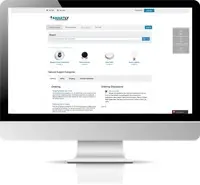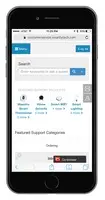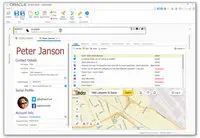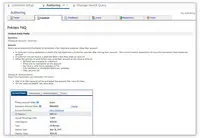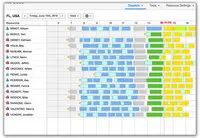Overview
What is Oracle Fusion Service?
Oracle Service Cloud is the help desk and customer experience management platform from Oracle. The technology was developed and supported by RightNow Technologies as RightNow CX for cloud-based call center automation, until that company's acquisition by Oracle in 2011 for…
Hybrid Oracle Blend
Great solution for Finance team to manage their day-to-day operations
Rocking
Why Oracle has to innovate
Great platform to manage Customers
Oracle Service Cloud Easy of Use!
Oracle Service - Provides 360 degree view
Not the right fit but good for others
A polyglot review of Oracle Service
Product with a lot to offer for CX-Service needs
Oracle Service is simple to use and configure.
Oracle Service review
We have used customized …
Love it and want more of it!
Powerful customer service systems and contact center apps
Awards
Products that are considered exceptional by their customers based on a variety of criteria win TrustRadius awards. Learn more about the types of TrustRadius awards to make the best purchase decision. More about TrustRadius Awards
Popular Features
- Ticket creation and submission (74)8.787%
- Ticket response (74)8.080%
- Email support (74)7.979%
- Internal knowledge base (74)7.777%
Reviewer Pros & Cons
Pricing
What is Oracle Fusion Service?
Oracle Service Cloud is the help desk and customer experience management platform from Oracle. The technology was developed and supported by RightNow Technologies as RightNow CX for cloud-based call center automation, until that company's acquisition by Oracle in 2011 for about $1.5 billion.
Entry-level set up fee?
- No setup fee
Offerings
- Free Trial
- Free/Freemium Version
- Premium Consulting/Integration Services
Would you like us to let the vendor know that you want pricing?
7 people also want pricing
Alternatives Pricing
What is Intercom?
Intercom creates modern Customer Service software that aims to redefine how businesses support their customers. The platform connects businesses directly to customers using powerful messaging and automation. According to the vendor, Intercom enables teams to scale support without investing more…
What is LiveAgent?
LiveAgent is a help desk software designed to help users bring personalization to customer interactions. LiveAgent presents an omnichannel universal inbox, real-time live chat, built-in call center, and a customer service portal. It offers customer segmentation, automation, built-in CRM, and an…
Product Demos
RightNow CTI Integration Demo
Doctor CX - Oracle Service Cloud - Dynamic Agent Desktop Demo
Features
Incident and problem management
Streamlining ticketing and service restoration processes
- 7.4Organize and prioritize service tickets(73) Ratings
Prioritize tickets to ensure most urgent are tackled first
- 7.5Expert directory(53) Ratings
Directory of IT and businesses services available to customers to help route tickets to appropriate subject matter experts
- 7.5Subscription-based notifications(57) Ratings
Users subscribe to notifications for ticket updates
- 6.7ITSM collaboration and documentation(50) Ratings
Issue resolution through collaboration mechanisms like discussion threads, social tools; agents can attach notes, files, etc. to tickets in order to maintain a record of all interactions related to the case.
- 8.7Ticket creation and submission(74) Ratings
Users and agents can easily enter new support requests.
- 8Ticket response(74) Ratings
Agents can easily follow up with customers.
Self Help Community
Features that allow customers to self-service for support issues.
- 6.9External knowledge base(65) Ratings
Customers can self-service by searching through help articles.
- 7.7Internal knowledge base(74) Ratings
Internal knowledge base helps agents answer customers' support questions.
Multi-Channel Help
Features related to providing customer service and support via different communication channels. Communications are organized by ticket/customer/channel for the convenience of agents.
- 7.5Customer portal(69) Ratings
Customer portal allows customers to submit tickets themselves and/or access self help resources.
- 7.6IVR(35) Ratings
Includes an interactive voice response system for routing callers to the correct agent or information.
- 4.9Social integration(46) Ratings
Agents can communicate with customers via social networks like Facebook and Twitter; may also include brand activity monitoring/reporting capabilities.
- 7.9Email support(74) Ratings
Integrates with email so that agents can send and receive information related to support tickets via email; email communications are attached to support tickets.
- 8.6Help Desk CRM integration(54) Ratings
Integrates with CRM so that tickets and support communications are coordinated with customers' records.
Product Details
- About
- Competitors
- Tech Details
- FAQs
What is Oracle Fusion Service?
Oracle Service (formerly Oracle Service Cloud), part of the Oracle Advertising and Customer Experience suite, is a cloud-based, omnichannel solution that delivers relevant, connected customer experiences via personalized service interactions with a 360-degree view of the customer. With both B2C and B2B offerings, Oracle Service empowers businesses to offer customers various choices to engage across channels—anywhere, and any time—while balancing automation and intelligence with high-value customer engagement. Oracle Service's approach is driven by knowledge, automation, and evolving customer engagement channels, simplifying every service experience for agents and customers alike. By helping to differentiate an organization’s service experience, Oracle Service aims to deliver measurable business impacts across all industries.
The platform includes: Digital Customer Service, Service Center, Field Service, Knowledge Management, Customer Data Management, and Intelligent Advisor.
Oracle Fusion Service Screenshots
Oracle Fusion Service Video
Oracle Fusion Service Competitors
Oracle Fusion Service Technical Details
| Deployment Types | Software as a Service (SaaS), Cloud, or Web-Based |
|---|---|
| Operating Systems | Unspecified |
| Mobile Application | Apple iOS, Android, Windows Phone, Blackberry, Mobile Web |
| Supported Languages | Arabic, Bulgarian, Chinese, Croatian, Czech, Danish, Dutch, English, Estonian, Finnish, French, German, Hungarian, Italian, Japanese, Korean, Latvian, Lithuanian, Greek, Norwegian, Polish, Portuguese, Romanian, Russian, Serbian, Slovenian, Spanish, Swedish, Turkish, Ukranian |
Frequently Asked Questions
Comparisons
Compare with
Reviews and Ratings
(237)Attribute Ratings
- 10Likelihood to Renew9 ratings
- 10Availability1 rating
- 9Performance1 rating
- 10Usability5 ratings
- 10Support Rating7 ratings
- 9In-Person Training1 rating
- 9Implementation Rating4 ratings
- 9Configurability1 rating
- 10Product Scalability1 rating
- 5.8Ease of integration11 ratings
- 6Oracle Implementation Satisfaction1 rating
Reviews
(1-5 of 5)On cloud 9!
- Great overview
- Works well with Oracle CC&B
- No great solution for handling CC recipients on the emails sent in to Service Cloud. You need a custom report in order to easily see if any recipients are CC'd.
- Organize and prioritize service tickets
- 70%7.0
- ITSM collaboration and documentation
- 80%8.0
- Ticket creation and submission
- 100%10.0
- Ticket response
- 100%10.0
- External knowledge base
- 100%10.0
- Internal knowledge base
- 100%10.0
- Customer portal
- 100%10.0
- IVR
- 100%10.0
- Email support
- 100%10.0
- Help Desk CRM integration
- 100%10.0
- We are able to standardize and optimize handling through buttons, workflows and standardtexts
- Microsoft Dynamics 365 (formerly Microsoft Dynamics CRM)
- Call logging
- Email handling
- Customer portal
- We started using buttons, to simplify the way incidents are being transferred from one team to an other
- We might be adding a chat bot or digital assistant of some sort
- Product Reputation
- Vendor Reputation
- Third-party professional services
We started out with our design phase.
Then we had our UAT phase where we also made sure our system was approved in the market.
Then we went live and started adding customers.
Our project manager and the rest of management was responsible for the change management.
Unfortunately the business wasn't included enough which has given a few bumps on the road. So an important lesson is, that when implementing a new system, it's key that the entire business and all of the management team is backing up.
- It was change management related, due to lack of communication
- In-person training
- Self-taught
Most of our training was given while doing user acceptance testing, and getting the system approved by the market. When ever we were in doubt, our implementer helped us along.
Later on we started exploring by our selves.
I think my absolute best advice is, to not focus on what you used to have, but what core functionality you need, and then configure based on that.
You tend to want to build exactly the same functionality as you used to. In stead you should focus on the basic need, and then look into the best way to handle that process. We found, that some of things the business wanted, wasn't needed, but they requested it, because that was how it was done in the old system. So always challenge the configuration requests.
I guess a 10 would be if everything was just perfect - or more than perfect - all the time.
I think we get the help we need, when we needed, but usually we are able to solve issues and challenges through our partner and implementer or through the Oracle Customer Connect forum.
Through their technical webinars!
It's amazing, and it add's to my knowledge about Service Cloud. One of the latest was actually some of the things the technical support uses to find errors, so that's neat to be able to do, by yourself.
- Replying to emails due to standard texts
- Finding out who was cc'd in an email
We have never had any down time, slowness or anything.
Any error or instability that has occurrred has so far has been caused by user errors.
We have never had issues with downtime or it not being available.
Upgrades and maintenance also happens in weekends or at night.
- Our phone system
- Oracle CC&B
Integration was performed by our implementing partner but it is in the lighter end of integrations.
Our phone system creates a call task when ever agents answer the phone, and all our customers in Oracle CC&B are sync'ed to Service Cloud where they can be used as contacts.
- Not at this point
- File import/export
- Always get new functionality that inspires us to develope
- Agent browser knowledge
Oracle Service Cloud - Centralizing Customer Support Data Tracking and Communications
For the most part, this application is utilized primarily by technical support services, although the RMA department, customer support and administration will access it for various information gathering purposes.
We utilize full email services that allow incoming communication from customers as well as chat services to offer online support options for cases that might not require a full support phone call.
- Case note tracking. For our products and customers, and the associated support issues we face, case notes are vital. Oracle Service Cloud centralizes everything in one place.
- Online chat services. The ability to field multiple support cases simultaneously and integrate that into the database automatically is vital and streamlines that aspect of the support process.
- Integration with our SAP RMA database which allows the entering of data into that system through the Oracle Service Cloud interface. This minimizes the need for multiple apps running to facilitate the combined tasks into one support software.
- I do not have any cons for this software. It is a complex service tracking and communication software and requires some specific training in its use, but that is to be expected for what it is.
- Organize and prioritize service tickets
- 100%10.0
- Expert directory
- 80%8.0
- Subscription-based notifications
- 90%9.0
- ITSM collaboration and documentation
- N/AN/A
- Ticket creation and submission
- 100%10.0
- Ticket response
- 100%10.0
- External knowledge base
- 80%8.0
- Internal knowledge base
- 90%9.0
- Customer portal
- 80%8.0
- IVR
- N/AN/A
- Social integration
- N/AN/A
- Email support
- 100%10.0
- Help Desk CRM integration
- 100%10.0
- Oracle Service Cloud's ability to tie together the support department in our company to the customer as well as other areas of the company has narrowed the gap between support issues and resolution by placing everything into one easy-to-use and navigate interface.
- Allowing the customers to create their own email or chat support cases and insert them into the system for action by our support department helps provide quicker service response in some cases.
- Reports that indicate case status and time in system help to prioritize cases that may require more attention or more immediate resolution is a very beneficial function that we utilize regularly.
- Support case tracking for integrated partner trouble tickets
- Ability to process reports to determine trending in particular products that might have a widespread issue resulting in more support case volume
- Tracking of integrated partner cases to help determine possible need for more training or additional services to assist their ability to better help themselves on reoccurring support issues.
- Integrate support ticket information into a searchable web interface that allows end users to find previous support tickets so they may reference previous solutions to what they may be currently experiencing.
- We are looking at possibly integrating into more social media outlets and if Oracle Service Cloud can offer a smoother integrating into that process, then the ability to tie it into our existing dataset would be preferred over other options.
Oracle Service Cloud
- Customer portal allows for easy management and customization of the end user pages to deliver our FAQs.
- Intelligent chat and email routing allow us to get the customer to the most experienced agents.
- Incident management allows us to collect all the pertinent information from the customer and send this information to our tier 2 team to be completed.
- Social Monitoring is a little lacking and needs to be more robust.
- Organize and prioritize service tickets
- 100%10.0
- Expert directory
- 100%10.0
- Subscription-based notifications
- 100%10.0
- ITSM collaboration and documentation
- 70%7.0
- Ticket creation and submission
- 100%10.0
- Ticket response
- 100%10.0
- External knowledge base
- 100%10.0
- Internal knowledge base
- 80%8.0
- Customer portal
- 100%10.0
- Social integration
- 30%3.0
- Email support
- 100%10.0
- Oracle Service Cloud has improved our tier 2 teams efficiency.
- Having all of the customer interactions in one place for the agent allows the agent to best service the customer.
- Chat
- Emails
- Incident Management
- We use the APIs to automate emails to customers based on order status.
- We use the APIs to manager our tracer process with our carrier.
- Bringing all customer data from our different order management systems in Oracle for a single view of the customer.
Oracle RightNow: the Cadillac of CRMs
- Handles and prioritizes emails, chats, and incidents well.
- Very extensive help documentation and support.
- Well-organized considering its complexity.
- Robust in handling different agent skill sets and permissions.
- Various aspects of service integrate well (e.g. knowledge base and incident handling).
- Frequent upgrades that are very thoroughly supported.
- Very robust and customizable analytics..
- I'd like to see agent skills switched to be agent-based rather than profile-based. (Supposedly this is coming in a future release). Under the current setup, agents are assigned to profiles in a many-to-one ratio. Each profile represents a combination of skills that the agent handles. This limits agent permissions to profiles... we can't just add "Skill X" or "Queue Y" to an agent without creating a unique profile for them. It would be much more scalable and agile to customize skills for each agent... that way, for instance, an agent could get trained on "Skill X" and then start getting emails from the "Skill X" queue while their untrained-for-X peers wouldn't.
- Better tutorials for absolute beginners. (The tutorials are there; but I mean tutorials for absolute first-timers.)
- Support is thorough, but for complicated issues it can sometimes take several rounds of back-and-forth.
- Analytics are robust, but not intuitive, and absolutely require training.
- RightNow does not currently have an easy way to integrate with some of the big WFM (workforce management) players in the space, without very extensive (and expensive) custom consulting work. Our phone vendor can do it for a few $k. But RightNow can't. This is an increasingly important trend and the lack of an API for this is a big weakness.
Other tips: definitely have someone be in charge of analytics, and then send them to the Analytics training course. Expect extra time (and cost) for integration or implementation, because things are always complicated at this scale. And when designing layouts and workspaces, consider foremost the agent experience. Ask the agents what they need and use, and work from there... rather than deciding what they need and then forcing it upon them. Find this out, address it, and then constantly re-evaluate against it.
As I've mentioned elsewhere, a big weakness is that it does not have an API to integrate with common WFM (workforce management) applications. If you're going to need this, this could be an issue. I've dinged it points for this.
- It is essential for our large-scale customer service operation. It scales well based on load.
- Provides us with accurate metrics to measure employee productivity and customer satisfaction.
For a more recent integration, we switched a newly-acquired site from Zendesk because we needed it to fit into our larger RightNow ecosystem.
2) Analytics person.
3) It's REALLY helpful to have someone who can administer the portal and portal development.
- Answering, routing, and prioritizing customer chats.
- Answering, routing, and prioritizing customer emails.
- Extensive knowledge base and help center capability.
- I've used Custom Objects to build a feature that tracks operational incidents (external to RightNow), and how they impact RightNow incidents.
- We are looking into sales/marketing features for the future.
- Price
- Product Features
- Product Reputation
- Vendor Reputation
- Implemented in-house
- Professional services company
- Every bit of it seemed to be more complex than anticipated, because of the interdependency of all the components. (Each part affected other parts.)
- Agent account setup.
- Business rules and routing.
- Mailbox setup can be tricky.
- Product/category setup and linking has some peculiarities that are essential to know.
- Customer Portal (all the customer-facing end-user pages) is really tricky and cumbersome and is the most difficult part of maintaining RightNow.
Review of the RightNow Knowledgebase
- The Knowledgebase searching capabilities were much better than the previous system we used. In addition to searching the body of the answer, it will also search the first several hundred unique words of the attachments.
- The software is very flexible. Almost everything is customizable.
- You can get very detailed reports concerning which answers and attachments are looked at, and by which customers, each month. This data is only kept for 30 days, but you can setup rules to automatically export the reports to files that can be emailed.
- Customers can "subscribe" to get notified if a specific answer gets updated, or anything in a particular category is created or updated. When you update an answer, you can decide if you want to generate a notification to subscribed customers. For example, if you are just changing the grammar, you won't want a notification to go out.
- You can easily add links to other answers within your answer. This prevents you from having to duplicate information in various related answers.
- The Knowledgebase has a feature where it will suggest other related answers for you to look at. The problem is that there is no way to limit the suggestions to the category you are currently in. For instance, if the customer is looking at notebook computer answers, the system will suggest answers in a server or modem category. This caused a problem for us because when customers were looking at answers related to a current product, RightNow would recommend answers that were associated with legacy products we no longer sold and thus didn't want to advertise. Because we could not limit suggested answers to the same category, even after consulting with RightNow experts, we had to turn this feature off.
- RightNow has a lot of great reports that show answer statistics -- how many times each answer has been viewed each day/week/month, etc (however you configure the report). However, they don't have a way to add an IP address range to ignore, or a company name to ignore, so that you can filter out internal company views. We wanted to know how many customers viewed answers vs seeing reports that lumped our support personnel statistics in with customer statistics.
- RightNow doesn't automatically filter out SPAM IP addresses in their reports or access counts. We suddenly noticed that the numbers on our statistical reports had increased from previous months. When I explored the huge increase with RightNow, I found out that known spammers had been hitting our site. Rather than RightNow filtering out the IPs at a corporate level, each customer has to monitor for spamming hits and individually enter in the IP addresses into their configuration software to get them excluded. We were frustrated because this requirement/process was not communicated to us when we started using the software. Thus, we had a couple months of useless statistical data (RightNow was unable to go back and filter the spammer data from our reports. However, they did give us a credit on our monthly usage).
- As an administrator of our Knowledgebase, I wanted to be notified whenever anybody edited an answer, vs just getting a notice when a new answer was created. RightNow support engineers told me this was not possible, so I had to manually scan reports a couple of times a month to see which answers changed. I wish there had been a way to get an automatic notification the same day an answer was changed so that I could review it in a timely manner.
- Our customer service was greatly increased once we switched to the RighNow Knowledgebase because it was easier for customers to find needed information. The ability to search attachments contributed to the search improvements.
- Because each answer has an ID associated with it, we could tell a customer to just search for answer ###. In our old system, we had to tell customer to look for specific key words, and if they mis-typed something that would effect the search results.
- The Knowledgebase comes with a mobile app. This made it easier for our support engineers to assist customers while they were away from the office.
Other employees (developers and IT) did the back-end customization and maintenance.
Some of the back-end things needed to be changed by a developer who could do coding.
- Customer support -- provide answers to common questions about our products, so that customers could search the Knowlebase vs opening a ticket with support
- Assisting support engineers -- often our engineers would search the Knowledgebase when assisting customers
- Promoting products -- OLDI's website lines to product brochures and instructional videos that are included in the Knowledgebase
- Storing firmware/software updates -- when OLDI updates software or firmware, the updates are included in Knowledgebase answers so that customers can easily access them. A link to the answer can be easily sent to a customer.
- Product brochures used to be stored both on the company website and in the Knowledgebase. Now, the company's website simply links to the appropriate Knowledgebase answer.
- In the future they might explore implementing the Chat capability.
- Product Features
- Product Usability
- Positive Sales Experience with the Vendor
- Third-party Reviews
- Implemented in-house
- The company RightNow recommended we hire to provide us training and setup advice was not very knowledgable. After I leaned the product I realized that much of the advice they gave us was incorrect. Also, there were many things they should have told us to do that they didn't. For example, they knew that searching attachments was important to us, but they didn't tell us that this searching was not automatic. There was a hidden checkbox we had to check for each attachment we wanted searched. It was time-consuming to go back and check the boxes after-the-fact (once we realized our attachments weren't being searched).
- If I were to do it again, I would pay the extra money to hire RightNow consultants vs an external company during the implementation.
Once we finally connected with RightNow staff, they were very knowledgeable

